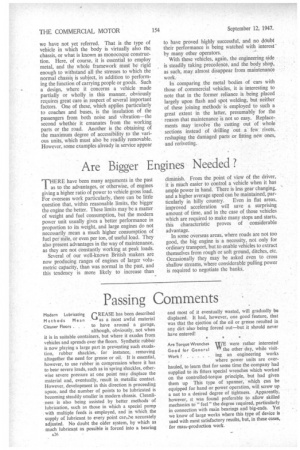Are Bigger Engines• Needed ?
Page 28

If you've noticed an error in this article please click here to report it so we can fix it.
rrHERE have been many arguments in the past J. as to the advantages, or otherwise, of engines giving a higher ratio of power to vehicle gross load. For overseas work particularly, there can be little question that, within reasonable limits, the bigger the engine the better. These limits may be a matter of weight and fuel consumption, but the modern power unit usually gives a better performance in proportion to its weight, and large engines do not necessarily mean a much higher consumption of fuel per mile, or even per ton, of useful load. They also present advantages in the way of maintenance, as they are not constantly working at peak loads.
Several of our well-known British makers are now producing ranges of engines of larger volumetric capacity, than was normal in the past, and this tendency is more likely to increase than diminish. From the point of view of the driver, it is much easier to control a vehicle when it has ample power in hand. There is less gear changing, and a higher average speed can be maintained, par ticularly in hilly country. Even in flat areas, improved acceleration will save a surprising amount of time, and in the case of those vehicles which are required to make many stops and starts, this characteristic proves of considerable advantage.
In some overseas areas, where roads are not too good, the big engine is a necessity, not only for ordinary transport, but to enable vehicles to extract themselves from rough or soft ground, ditches, etc. Occasionally they may be asked even to cross shallow streams, where considerable pulling power is required to negotiate the banks.




















































































